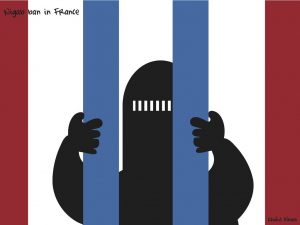By Lindsey Alpaugh, staff writer, RightsViews, Human Rights MA student.
French Muslims and French Electoral Politics
France is stomping on the freedom of religious expression of its Muslim population. This spring and winter have seen a slew of anti-Muslim legislation in France, with some political commentators believing these measures come in advance of a right-wing-oriented election in 2022.
On December 2nd, 2020 the Council of Ministers announced that it was dissolving the Collective against Islamophobia in France (CCIF). The CCIF was founded in 2003 to fight discrimination against Muslims in France, and to provide legal aid to those fighting discrimination cases. Criticizing this decision, Human Rights Watch stated that “under international and European human rights law, states can only restrict the rights to freedom of association, freedom of religion and belief, and freedom of expression in a way that is lawful, necessary, and proportionate. Dissolving associations under international human rights law should be a measure of last resort taken because an association advocates a clear, imminent threat of violence or has acted in grave violation of the law, and ideally made by a court.”
Then, this February 2021, France passed an “Anti-Radicalization Bill,” which looks to tackle the “root of jihadist violence” in France. What the bill does in reality, is gives the government the ability to close religious organizations or places of worship if they are found to disseminate or allow ideas or discussions that could “provoke hate or violence.” This legislation is seen as a response to the murder of teacher Samuel Paty in October 2020. Paty was targeted after he showed cartoons of the Prophet Muhammed in a lesson on freedom of expression. The bill passed with popular support. As written by Elaine Ganley for the AP, “After two weeks of intense debate, the vote in the National Assembly house was the first critical hurdle for the legislation that has been long in the making. The bill passed 347-151, with 65 abstentions.”
This law was followed by the introduction of an additional piece of legislation this April designed to prohibit “in the public space of any conspicuous religious sign by minors and of any dress or clothing which would signify inferiority of women over men.” This language references debates in France around the veil being a symbol of gendered oppression. In response to this ban, Rokhaya Diallo, a French journalist, author, and activist for racial, gender and religious activism wrote an opinion piece in the Washington Post.
She argued that the law was designed to undermine the civil liberties of French Muslims, stating that, “the new version of the law creates new reasons to surveil Muslim citizens and restricts their freedom of religion in a way that has never been seen before.” Diallo points out that such a ban, enacted to “protect young girls from dogma,” violates the International Standards on Freedom of Religion or Belief put forward by the United Nations.
Much like the other legislations addressed, this law acted in the name of State “secularism” and laïc values that the French State has made central to French identity since 1905. Article two of the 1905 law expresses that “the republic does not recognize, compensate or subsidize any religion.” This means that faith is a private matter for individuals, and should not interfere with the State or its operations. It should, in theory, result in the equal treatment of different religions in the face of the law. However, a slew of recent legislation in the name of this idea seems to disproportionately target Muslim women. laïcité has been used as a means to create laws that single French Muslim women out and has been a trend in the last ten years, with legislation such as the 2011 Burqa ban and the 2016 Birkini swimsuit-style ban from beaches.
Many political pundits believe that due to the upcoming French elections, President Emmanuel Macron is appealing to more right-wing voters through anti-Muslim legislation.
Macron and Separatism
In an article titled “The Weaponization of laïcité,” French legal scholar and commentator, Rim-Sarah Alouane argues that laïcité has been involved with the modern French state, but in a way that reveals the least savory aspects of French society. She writes,
“originally designed as a principle compatible with human rights, in which all individuals are equal regardless of their religion or belief, laïcité in France has since become a tool for political identity, and Muslim women are paying a high price for it. This new form of illiberal laïcité is a threat to human rights and religious freedom. Indeed, it imposes a uniform and restrictive vision of republican values and national identity, which is based on a rejection of diversity and on a monolithic and biased understanding of the wearing of the headscarf by Muslim women. This modern and problematic definition of laïcité is weaponized to push for the adoption of increasingly restrictive legislation and policies regarding the wearing of religious symbols, which now constitutes an acceptable form of legal discrimination against French Muslims.”

The problem with modern laïcité is not the principle of separation of religion and state, but the way that it has been interpreted to allow for increased scrutiny of Muslim practices as they differ from Catholic or Protestant practices.
Many journalists and political commentators, such as NPR’s France Correspondent, Eleanor Beardsley, believe that these bans come as Macron moves right in advance of the 2022 French Presidential election. With no real threat from the left, Macron is contenting heavily with Marine Le Pen, president of the far-right National Rally Party and candidate in the 2022 French presidential election. Beardsley argues that Macron’s strategy may only alienate him further from center and left voters while strengthening the rhetoric of Le Pen. Repeating a point initially made by Journalist Nadiya Lazzouni, Beardsley reiterated that Macron will “call on Muslims and humanists and freedom lovers to come out and support him to block her, but this time we may not show up.”
Even if it is not necessarily politically wise, Macron should do what is right and protect the civil liberties and rights to religious expression of his citizens.
Photos
“Nigab ban in france” by khalid Albaih is licensed under CC BY 2.0
“President Donald J. Trump and President Emmanuel Macron of France” by The White House is marked with CC PDM 1.0

